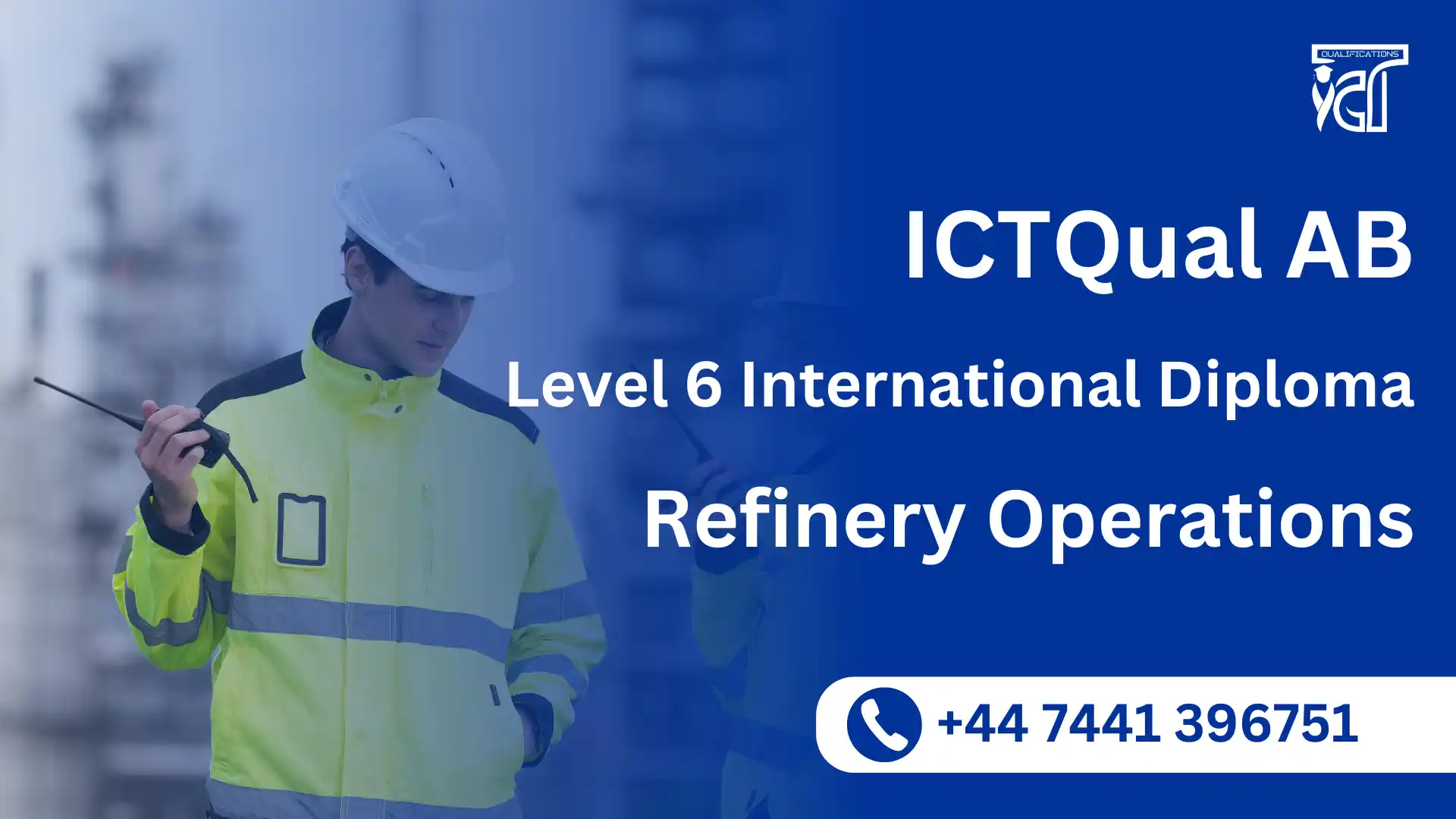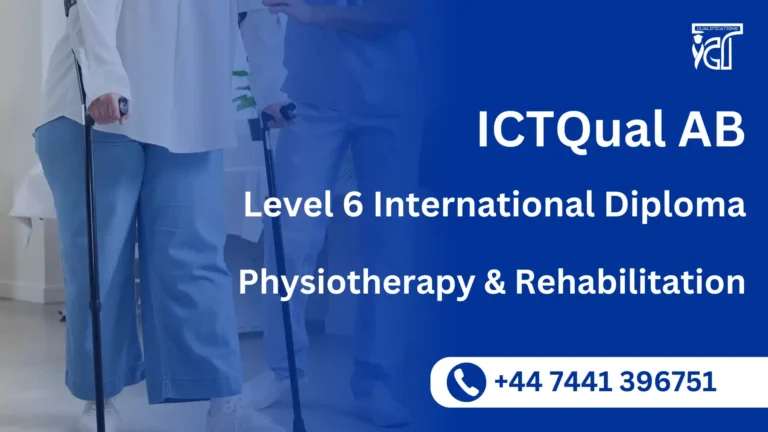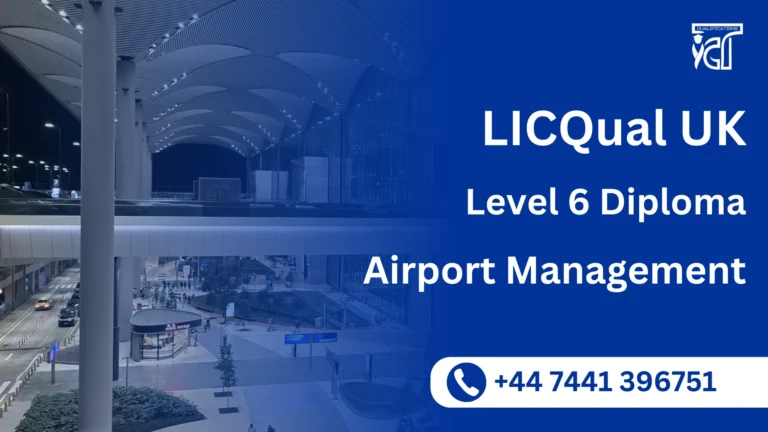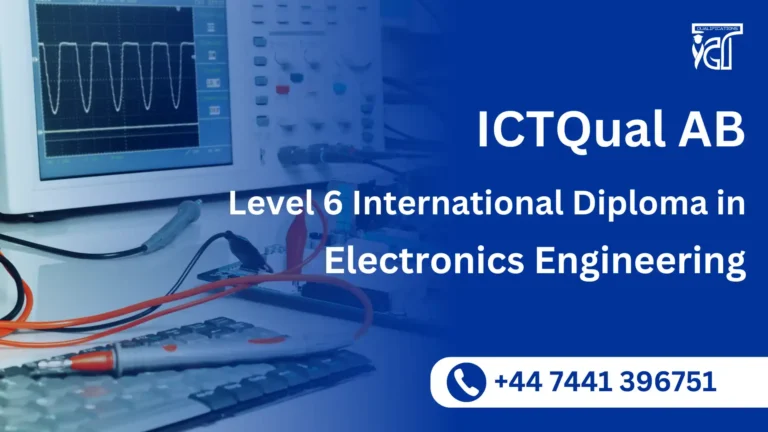The ICTQual AB Level 6 International Diploma in Refinery Operations is a comprehensive, industry-focused qualification designed to prepare learners for specialist and supervisory roles within the refining and downstream oil and gas sectors. Spanning three years and carrying 360 credits, this advanced programme blends theoretical knowledge with practical insights, ensuring learners are equipped to meet the demands of modern refinery environments worldwide.
Created for both fresh learners entering the energy industry and experienced professionals seeking to enhance their expertise, this diploma develops the competencies required to manage and optimise complex refining processes. Learners will explore critical topics such as process safety, equipment operations, energy efficiency, quality control, and environmental compliance—skills that are essential for operational excellence and regulatory adherence.
Graduates of this programme are positioned for rewarding careers as refinery operators, process technologists, shift supervisors, or operations coordinators within international refineries, petrochemical plants, and energy companies. The curriculum not only strengthens technical proficiency but also enhances problem-solving, decision-making, and leadership abilities, giving learners a competitive edge in a fast-evolving global market.
Completing this diploma offers significant long-term value: it provides a solid foundation for advanced studies in energy management, refinery engineering, or process optimisation, and supports progression into senior operational or management roles. By mastering refinery operations at an advanced level, learners will gain the skills, confidence, and recognition needed to succeed in one of the most critical areas of the global energy supply chain.
ICTQual AB Level 6 International Diploma in Refinery Operations
This qualification, the ICTQual AB Level 6 International Diploma in Refinery Operations, consists of 36 mandatory units.
Year 1 – Foundation in Refinery Operations
- Principles of Chemical Engineering
- Introduction to Petroleum Refining
- Crude Oil Properties and Analysis
- Refinery Process Units Overview
- Distillation Principles and Applications
- Heat and Mass Transfer in Refining
- Introduction to Catalysts and Chemical Reactions
- Process Instrumentation and Control Basics
- Health, Safety, and Environmental Awareness
- Industrial Laboratory Techniques
- Technical Report Writing
- Introduction to Process Simulation Software
Year 2 – Intermediate Refinery Operations
- Advanced Distillation and Separation Techniques
- Hydrocracking and Hydrotreating Processes
- Fluid Catalytic Cracking (FCC) Operations
- Process Control and Automation in Refineries
- Energy Management and Efficiency in Refining
- Reactor Design and Optimisation
- Process Safety Management
- Refinery Production Planning
- Quality Control and Assurance in Refining
- Environmental Management and Sustainability
- Petroleum Product Blending Techniques
- Data Analysis and Technical Communication
Year 3 – Advanced Refinery Operations
- Advanced Process Optimisation and Troubleshooting
- Refinery Project Management
- Catalysts and Reaction Kinetics in Depth
- Advanced Process Simulation and Modelling
- Corrosion and Maintenance in Refineries
- Energy Transition and Cleaner Refining Technologies
- Risk Assessment and Hazard Analysis
- Advanced Laboratory Techniques and Process Testing
- Supply Chain and Logistics in Refining
- Capstone Project in Refinery Operations
- Professional Development and Leadership in Energy
- Strategic Decision-Making in Refinery Management
Learning Outcomes for the ICTQual AB Level 6 International Diploma in Refinery Operations:
Year 1 – Foundation in Refinery Operations
Principles of Chemical Engineering
- Understand fundamental chemical engineering principles applied in refinery processes.
- Analyse material and energy balances in process systems.
- Apply chemical engineering concepts to basic refinery operations.
Introduction to Petroleum Refining
- Comprehend the overall structure and workflow of petroleum refining.
- Identify major refinery units and their functions.
- Explain the stages of crude oil conversion into usable products.
Crude Oil Properties and Analysis
- Examine the physical and chemical properties of crude oil.
- Conduct laboratory tests to characterise crude oil quality.
- Interpret analytical data for process planning and optimisation.
Refinery Process Units Overview
- Identify key refinery process units and their interconnections.
- Understand operational principles for each unit.
- Recognise the role of each unit in overall production efficiency.
Distillation Principles and Applications
- Explain the principles of distillation and separation.
- Apply distillation techniques to crude oil fractionation.
- Analyse the impact of operational parameters on product quality.
Heat and Mass Transfer in Refining
- Understand fundamental heat and mass transfer processes.
- Apply heat exchange and mass transfer principles in refinery operations.
- Solve basic engineering problems related to thermal and material flows.
Introduction to Catalysts and Chemical Reactions
- Understand types and roles of catalysts in refining reactions.
- Analyse chemical reaction mechanisms relevant to refinery processes.
- Apply basic concepts of reaction engineering in operational contexts.
Process Instrumentation and Control Basics
- Identify common instruments and control systems in refineries.
- Understand feedback and control loops for process stability.
- Apply basic control principles to ensure operational safety and efficiency.
Health, Safety, and Environmental Awareness
- Recognise hazards in refinery operations.
- Apply safety regulations, risk mitigation, and emergency procedures.
- Promote environmentally responsible practices in daily operations.
Industrial Laboratory Techniques
- Conduct practical laboratory tests for refinery operations.
- Apply standard operating procedures for sample handling and analysis.
- Interpret laboratory results to support process decisions.
Technical Report Writing
- Develop skills for preparing professional technical reports.
- Communicate operational, analytical, and experimental findings clearly.
- Apply correct scientific structure, formatting, and referencing.
Introduction to Process Simulation Software
- Gain basic proficiency in refinery process simulation tools.
- Model simple processes to predict operational outcomes.
- Use simulation data to support process understanding and decision-making.
Year 2 – Intermediate Refinery Operations
Advanced Distillation and Separation Techniques
- Apply advanced distillation methods for complex separation tasks.
- Analyse operational efficiency and product yield.
- Optimise separation processes using theoretical and practical knowledge.
Hydrocracking and Hydrotreating Processes
- Understand the principles and applications of hydrocracking and hydrotreating.
- Monitor reaction conditions and catalyst performance.
- Evaluate product quality and process efficiency.
Fluid Catalytic Cracking (FCC) Operations
- Analyse FCC unit operation principles and reactions.
- Apply knowledge to optimise conversion rates and product distribution.
- Identify operational challenges and troubleshooting methods.
Process Control and Automation in Refineries
- Implement advanced control strategies in refinery units.
- Use automation systems to enhance process stability and efficiency.
- Analyse process data for continuous improvement.
Energy Management and Efficiency in Refining
- Identify energy consumption patterns in refinery operations.
- Apply strategies to reduce energy waste and improve efficiency.
- Monitor energy usage and implement optimisation techniques.
Reactor Design and Optimisation
- Understand design principles for industrial reactors.
- Analyse reactor performance for various chemical processes.
- Optimise operating conditions for maximum output and safety.
Process Safety Management
- Apply safety management systems in refinery operations.
- Conduct hazard identification, risk assessment, and mitigation.
- Promote a culture of safety and compliance within operational teams.
Refinery Production Planning
- Develop production schedules aligned with operational capacity.
- Analyse demand and optimise resource allocation.
- Apply planning tools to maintain continuous and efficient operations.
Quality Control and Assurance in Refining
- Implement quality assurance standards and inspection procedures.
- Analyse product specifications to ensure compliance.
- Apply corrective actions to maintain consistent product quality.
Environmental Management and Sustainability
- Identify environmental impacts of refinery operations.
- Implement sustainable practices and regulatory compliance.
- Promote environmental stewardship in production processes.
Petroleum Product Blending Techniques
- Understand blending principles for fuels and lubricants.
- Analyse compatibility and quality of blended products.
- Apply operational techniques to achieve desired specifications.
Data Analysis and Technical Communication
- Interpret process and operational data effectively.
- Develop reports, presentations, and documentation for technical audiences.
- Use data-driven insights to improve operational performance.
Year 3 – Advanced Refinery Operations
Advanced Process Optimisation and Troubleshooting
- Apply advanced techniques to optimise refinery processes.
- Identify operational bottlenecks and implement corrective actions.
- Enhance efficiency, safety, and product quality through analysis.
Refinery Project Management
- Plan, execute, and manage refinery projects.
- Allocate resources and manage project risks effectively.
- Evaluate project outcomes and implement best practices.
Catalysts and Reaction Kinetics in Depth
- Analyse catalyst behaviour and reaction kinetics for industrial processes.
- Apply kinetic models to optimise refinery reactions.
- Troubleshoot catalyst-related issues to maintain efficiency.
Advanced Process Simulation and Modelling
- Use advanced simulation tools for process design and optimisation.
- Model complex refinery operations and predict outcomes.
- Apply simulations to decision-making and performance evaluation.
Corrosion and Maintenance in Refineries
- Understand causes and prevention of corrosion in refinery equipment.
- Develop maintenance strategies to prolong equipment life.
- Apply best practices in inspection, repair, and safety compliance.
Energy Transition and Cleaner Refining Technologies
- Evaluate sustainable technologies and cleaner production methods.
- Implement energy-efficient and low-emission practices.
- Analyse the impact of renewable integration on refinery operations.
Risk Assessment and Hazard Analysis
- Conduct comprehensive risk assessments for refinery processes.
- Identify hazards, assess impact, and implement mitigation strategies.
- Develop contingency plans to ensure operational safety.
Advanced Laboratory Techniques and Process Testing
- Perform high-level laboratory analyses to support process optimisation.
- Apply testing results to refine operational parameters.
- Ensure laboratory data informs strategic decision-making.
Supply Chain and Logistics in Refining
- Analyse the supply chain for refinery feedstock and products.
- Optimise logistics, storage, and distribution strategies.
- Integrate operational planning with supply chain efficiency.
Capstone Project in Refinery Operations
- Conduct an in-depth project integrating knowledge from all previous units.
- Solve real-world refinery challenges using analytical and practical skills.
- Present findings and recommendations professionally.
Professional Development and Leadership in Energy
- Develop leadership, management, and communication skills.
- Enhance teamwork, decision-making, and strategic thinking.
- Prepare for senior roles in operational and technical management.
Strategic Decision-Making in Refinery Management
- Apply analytical and strategic tools for refinery decision-making.
- Evaluate operational, financial, and environmental factors.
- Implement strategies for long-term performance and sustainability.
The ICTQual AB Level 6 International Diploma in Refinery Operations equips learners with advanced technical knowledge, operational expertise, and globally relevant skills for the refining and downstream oil and gas sectors. This three-year, 360-credit qualification enhances employability, career growth, and academic progression opportunities for both fresh learners and experienced professionals.
Industry-Relevant Knowledge and Skills
- Gain in-depth understanding of refinery processes, equipment operations, and energy optimisation.
- Learn best practices in process safety, environmental compliance, and quality assurance.
- Develop problem-solving, analytical, and decision-making skills for complex refinery challenges.
- Acquire hands-on insights into operational efficiency and process control.
- Strengthen knowledge aligned with international refining standards.
Enhanced Career Opportunities
- Qualify for roles such as Refinery Operator, Process Technologist, Shift Supervisor, or Operations Coordinator.
- Increase employability with global refineries, petrochemical plants, and energy companies.
- Build a strong professional profile for supervisory and managerial positions.
- Access opportunities across onshore and offshore refining operations.
- Gain transferable skills suitable for related energy and process industries.
Professional Development and Recognition
- Earn a respected Level 6 qualification valued by employers in the global energy market.
- Strengthen leadership and teamwork capabilities for high-responsibility roles.
- Establish a pathway to Level 7 Diplomas or advanced studies in refinery or energy management.
- Gain recognition for technical proficiency in refining operations.
- Build a long-term foundation for career advancement and specialisation.
Flexible and Future-Focused Learning
- Three-year, 360-credit structure balances practical application with theoretical depth.
- Suitable for both fresh learners entering the industry and seasoned professionals.
- Supports adaptability in a rapidly evolving global energy landscape.
- Provides knowledge and skills to meet sustainability and innovation goals.
- Prepares learners for future trends in refining and downstream operations.
The ICTQual AB Level 6 International Diploma in Refinery Operations is designed for motivated learners aiming to build or advance a career in refinery and downstream oil and gas operations. It is suitable for both fresh entrants seeking foundational expertise and experienced professionals looking to strengthen their skills for senior or specialised roles in the global energy industry.
Fresh Entrants to the Energy Sector
- Learners aspiring to start a career in refinery operations or petrochemical processing.
- Recent graduates aiming to gain a recognised qualification for competitive job markets.
- Individuals eager to develop technical, analytical, and operational skills in refining.
- Fresh candidates seeking international career opportunities in the energy industry.
- Those passionate about energy efficiency, process safety, and sustainable refining.
Experienced Refinery and Oil & Gas Professionals
- Refinery operators, process technologists, or shift supervisors seeking advancement.
- Professionals aiming to formalise and update their technical knowledge.
- Learners looking to expand expertise in process control, energy optimisation, and safety.
- Individuals targeting leadership or consultancy positions in refinery operations.
- Energy sector workers preparing for global mobility and higher responsibilities.
Career Changers and Industry Aspirants
- Professionals from related fields such as chemical engineering or industrial operations transitioning to refinery roles.
- Learners exploring opportunities in refining, petrochemicals, or energy management.
- Candidates seeking structured training to enter or progress within the refining sector.
- Individuals wanting to diversify their technical skill set for broader career options.
- Those interested in contributing to operational excellence and innovation in global energy.
Completing the ICTQual AB Level 6 International Diploma in Refinery Operations provides learners with strong academic and professional foundations to advance their careers or pursue higher-level studies. The qualification is recognised internationally, opening pathways to senior refinery roles, advanced diplomas, and postgraduate programmes in energy and process management.
Academic Progression
- Progress to Level 7 Diplomas in Oil & Gas Engineering, Refinery Management, or related fields.
- Enrol in Master’s programmes such as Energy Management, Process Engineering, or Refinery Operations.
- Pursue advanced certifications in refinery optimisation, process safety, or operational leadership.
- Access opportunities for research or specialist study in refining and downstream operations.
- Strengthen academic credentials for future qualifications in global energy or process industries.
Career Progression
- Qualify for senior roles such as Refinery Supervisor, Process Manager, or Operations Coordinator.
- Enhance eligibility for technical and leadership positions in global refineries and petrochemical plants.
- Prepare for consultancy or project management roles in downstream oil and gas operations.
- Build expertise for opportunities in emerging energy sectors and sustainable refining practices.
- Improve long-term career mobility and recognition within the international energy market.
As an approved centre of ICTQual AB, we provide two clear certification pathways for learners pursuing the ICTQual AB Level 6 International Diploma in Refinery Operations. These routes are designed to suit both experienced industry professionals and fresh learners worldwide:
Route One – Experienced Professionals
- This pathway is tailored for learners with a minimum of six years of verifiable experience in refinery operations, downstream oil and gas, or related fields.
- It recognises prior knowledge and industry expertise, enabling experienced professionals to achieve the diploma more efficiently.
Route Two – Fresh Candidates
- This route is intended for learners without significant refinery experience or new entrants to the industry.
- Fresh candidates are required to complete 36 structured assignments that cover all essential units of the qualification.
- It ensures that every learner gains a comprehensive understanding of refinery operations and develops the skills needed for global career opportunities.
Enrol with us today, as an authorised ICTQual AB centre, to take the route that aligns with your experience and career goals. Both pathways lead to the same internationally recognised qualification, preparing you for advanced opportunities in refinery operations across the global energy sector.
Entry Requirements
To join the ICTQual AB Level 6 International Diploma in Refinery Operations, learners must meet the following criteria to ensure they are prepared for the academic and technical demands of this advanced programme:
Minimum Age
- Learners must be at least 18 years old at the time of enrolment.
Educational Background
- A Level 5 Diploma or equivalent qualification in a related field such as refinery operations, chemical engineering, or industrial processing is preferred.
- Fresh candidates may also be accepted with a strong secondary education record, especially in science or engineering-related subjects.
Industry Experience
- Route One: Learners should have at least six years of verifiable industry experience in refinery operations, downstream oil and gas, or related sectors.
- Route Two: Fresh candidates without prior industry experience must complete 36 structured assignments as part of the course.
Language Proficiency
- Learners should have a good command of English to effectively engage with course materials, participate in assessments, and communicate in an international energy environment.
- Non-native speakers may be asked to provide evidence of prior study in English or recognised test results.
Register Now
Qualification Process
Qualification Process for the ICTQual AB Level 6 International Diploma in Refinery Operations
- Self-Assessment:
Begin by evaluating your eligibility to ensure you meet the qualification requirements, including work experience, knowledge, and language proficiency. - Registration:
Complete your registration by submitting the required documents, including a scanned copy of a valid ID, and paying the registration fee. - Induction:
An assessor will conduct an induction to confirm your eligibility for the course and explain the evidence requirements. If you do not meet the criteria, your registration will be cancelled, and the fee will be refunded. - Assignments & Evidence Submission:
Provide all assignments and the necessary evidence based on the assessment criteria outlined in the course. If you are unsure of the required evidence, consult with the assessor for guidance on the type and nature of evidence needed. - Feedback and Revision:
The assessor will review your submitted evidence and provide feedback. Evidence that meets the criteria will be marked as “Criteria Met,” while any gaps will be identified. You will be asked to revise and resubmit if needed. - Competence Evidence:
Submit final evidence demonstrating that all learning outcomes have been met. This evidence will be marked as “Criteria Met” by the assessor once it is satisfactory. - Internal Quality Assurance (IQA):
The Internal Quality Assurance Verifier (IQA) will review your evidence to ensure consistency, quality, and compliance with standards. - External Verification:
The IQA will submit your portfolio to ICTQUAL AB External Quality Assurance Verifiers (EQA) for final confirmation. The EQA may contact you directly to verify the authenticity of your evidence. - Certification:
Upon successful completion of all checks, ICTQUAL AB will issue your official certificate, confirming that you have attained the ICTQual AB Level 6 International Diploma in Refinery Operations.







